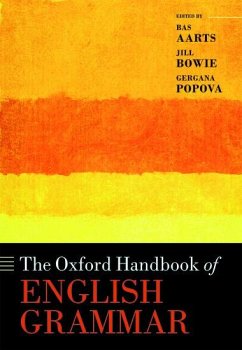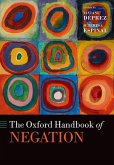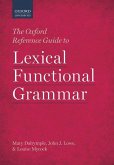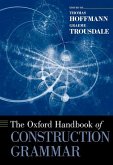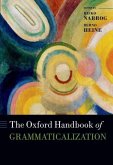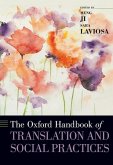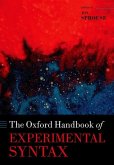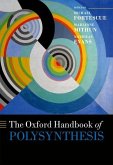Oxford Handbook of English Grammar
Herausgeber: Aarts, Bas; Popova, Gergana; Bowie, Jill
Oxford Handbook of English Grammar
Herausgeber: Aarts, Bas; Popova, Gergana; Bowie, Jill
- Gebundenes Buch
- Merkliste
- Auf die Merkliste
- Bewerten Bewerten
- Teilen
- Produkt teilen
- Produkterinnerung
- Produkterinnerung
This handbook provides an authoritative, critical survey of current research and knowledge in the grammar of the English language. The volume's expert contributors explore a range of core topics in English grammar, covering a range of theoretical approaches and including the relationship between 'core' grammar and other areas of language.
Andere Kunden interessierten sich auch für
![The Oxford Handbook of Negation The Oxford Handbook of Negation]() The Oxford Handbook of Negation258,99 €
The Oxford Handbook of Negation258,99 €![The Oxford Reference Guide to Lexical Functional Grammar The Oxford Reference Guide to Lexical Functional Grammar]() Mary DalrympleThe Oxford Reference Guide to Lexical Functional Grammar258,99 €
Mary DalrympleThe Oxford Reference Guide to Lexical Functional Grammar258,99 €![The Oxford Handbook of Construction Grammar The Oxford Handbook of Construction Grammar]() Thomas HoffmannThe Oxford Handbook of Construction Grammar246,99 €
Thomas HoffmannThe Oxford Handbook of Construction Grammar246,99 €![Oxford Handbook of Grammaticalization Oxford Handbook of Grammaticalization]() Oxford Handbook of Grammaticalization258,99 €
Oxford Handbook of Grammaticalization258,99 €![The Oxford Handbook of Translation and Social Practices The Oxford Handbook of Translation and Social Practices]() The Oxford Handbook of Translation and Social Practices233,99 €
The Oxford Handbook of Translation and Social Practices233,99 €![The Oxford Handbook of Experimental Syntax The Oxford Handbook of Experimental Syntax]() The Oxford Handbook of Experimental Syntax211,99 €
The Oxford Handbook of Experimental Syntax211,99 €![The Oxford Handbook of Polysynthesis The Oxford Handbook of Polysynthesis]() The Oxford Handbook of Polysynthesis233,99 €
The Oxford Handbook of Polysynthesis233,99 €-
-
-
This handbook provides an authoritative, critical survey of current research and knowledge in the grammar of the English language. The volume's expert contributors explore a range of core topics in English grammar, covering a range of theoretical approaches and including the relationship between 'core' grammar and other areas of language.
Hinweis: Dieser Artikel kann nur an eine deutsche Lieferadresse ausgeliefert werden.
Hinweis: Dieser Artikel kann nur an eine deutsche Lieferadresse ausgeliefert werden.
Produktdetails
- Produktdetails
- Verlag: Hurst & Co.
- Seitenzahl: 864
- Erscheinungstermin: 14. Januar 2020
- Englisch
- Abmessung: 249mm x 183mm x 56mm
- Gewicht: 1724g
- ISBN-13: 9780198755104
- ISBN-10: 0198755104
- Artikelnr.: 55322148
- Herstellerkennzeichnung
- Libri GmbH
- Europaallee 1
- 36244 Bad Hersfeld
- gpsr@libri.de
- Verlag: Hurst & Co.
- Seitenzahl: 864
- Erscheinungstermin: 14. Januar 2020
- Englisch
- Abmessung: 249mm x 183mm x 56mm
- Gewicht: 1724g
- ISBN-13: 9780198755104
- ISBN-10: 0198755104
- Artikelnr.: 55322148
- Herstellerkennzeichnung
- Libri GmbH
- Europaallee 1
- 36244 Bad Hersfeld
- gpsr@libri.de
Bas Aarts is Professor of English Linguistics and Director of the Survey of English Usage at University College London. His previous books with OUP include Fuzzy Grammar: A Reader (OUP, 2004), Syntactic Gradience (2007), Oxford Modern English Grammar (2011), The Oxford Dictionary of English Grammar (2nd edition 2014) and How to Teach Grammar (2019). He is a founding editor of the journal English Language and Linguistics. Jill Bowie is an Honorary Research Fellow at the Survey of English Usage, University College London, where she previously worked on the AHRC-funded projects 'The changing verb phrase in present-day British English' and 'Teaching English grammar in schools'. Her research interests include recent change in English and the grammar of spoken discourse. She has co-authored papers with Survey colleagues on clause fragments and on changes in the English verb phrase Gergana Popova is Lecturer in Linguistics at Goldsmiths, University of London. Her interests are in theoretical linguistics, specifically morphology and its interfaces, and lexical semantics. She is the co-editor, with Bas Aarts, David Denison, and Evelien Keizer, of Fuzzy Grammar: A Reader (OUP, 2004), author of articles and book chapters, and co-author, with Andrew Spencer, of the forthcoming OUP monograph Periphrasis.
* Introduction
* Part I: Grammar writing and methodology
* 1: Margaret Thomas: Conceptualizations of grammar in the history of
English grammaticology
* 2: Bas Aarts: Syntactic argumentation
* 3: Jon Sprouse and Carson T. Schütze: Grammar and the use of data
* 4: Sean Wallis: Grammar and corpus methodology
* Part II: Approaches to English grammar
* 5: John R. Taylor: Cognitive linguistic approaches
* 6: Martin Hilpert: Constructional approaches
* 7: Thomas Herbst: Dependency and valency approaches
* 8: Terje Lohndal and Liliane Haegeman: Generative approaches
* 9: J. Lachlan Mackenzie: Functional approaches
* 10: Rodney Huddleston and Geoffrey K. Pullum: Modern and traditional
descriptive approaches
* 11: Andrew Spencer: Theoretical approaches to morphology
* Part III: Subdomains of grammar
* 12: Andrew Spencer: Inflection and derivation
* 13: Laurie Bauer: Compounds
* 14: Willem B. Hollmann: Word classes
* 15: Robert D. Borsley: Phrase structure
* 16: Evelien Keizer: Noun phrases
* 17: Patrick Duffley: Clause structure, complements, and adjuncts
* 18: Ekkehard König: Clause types and speech act functions
* 19: Ilse Depraetere and Anastasios Tsangalidis: Tense and aspect
* 20: Debra Ziegeler: Mood and modality
* 21: Thomas Egan: Subordination and coordination
* 22: Gunther Kaltenböck: Information structure
* Part IV: Grammar and other fields of enquiry
* 23: Doris Schönefeld: Grammar and lexis
* 24: Sam Hellmuth and Ian Cushing: Grammar and phonology
* 25: Ash Asudeh: Grammar and meaning
* 26: Jill Bowie and Gergana Popova: Grammar and discourse
* Part V: Grammatical variation and change
* 27: Marianne Hundt: Change in grammar
* 28: Peter Siemund: Regional varieties of English: non-standard
grammatical features
* 29: Bernd Kortmann: Global variation in the Anglophone world
* 30: Heidrun Dorgeloh and Anja Wanner: Genre variation
* 31: Lesley Jeffries: Literary variation
* Part I: Grammar writing and methodology
* 1: Margaret Thomas: Conceptualizations of grammar in the history of
English grammaticology
* 2: Bas Aarts: Syntactic argumentation
* 3: Jon Sprouse and Carson T. Schütze: Grammar and the use of data
* 4: Sean Wallis: Grammar and corpus methodology
* Part II: Approaches to English grammar
* 5: John R. Taylor: Cognitive linguistic approaches
* 6: Martin Hilpert: Constructional approaches
* 7: Thomas Herbst: Dependency and valency approaches
* 8: Terje Lohndal and Liliane Haegeman: Generative approaches
* 9: J. Lachlan Mackenzie: Functional approaches
* 10: Rodney Huddleston and Geoffrey K. Pullum: Modern and traditional
descriptive approaches
* 11: Andrew Spencer: Theoretical approaches to morphology
* Part III: Subdomains of grammar
* 12: Andrew Spencer: Inflection and derivation
* 13: Laurie Bauer: Compounds
* 14: Willem B. Hollmann: Word classes
* 15: Robert D. Borsley: Phrase structure
* 16: Evelien Keizer: Noun phrases
* 17: Patrick Duffley: Clause structure, complements, and adjuncts
* 18: Ekkehard König: Clause types and speech act functions
* 19: Ilse Depraetere and Anastasios Tsangalidis: Tense and aspect
* 20: Debra Ziegeler: Mood and modality
* 21: Thomas Egan: Subordination and coordination
* 22: Gunther Kaltenböck: Information structure
* Part IV: Grammar and other fields of enquiry
* 23: Doris Schönefeld: Grammar and lexis
* 24: Sam Hellmuth and Ian Cushing: Grammar and phonology
* 25: Ash Asudeh: Grammar and meaning
* 26: Jill Bowie and Gergana Popova: Grammar and discourse
* Part V: Grammatical variation and change
* 27: Marianne Hundt: Change in grammar
* 28: Peter Siemund: Regional varieties of English: non-standard
grammatical features
* 29: Bernd Kortmann: Global variation in the Anglophone world
* 30: Heidrun Dorgeloh and Anja Wanner: Genre variation
* 31: Lesley Jeffries: Literary variation
* Introduction
* Part I: Grammar writing and methodology
* 1: Margaret Thomas: Conceptualizations of grammar in the history of
English grammaticology
* 2: Bas Aarts: Syntactic argumentation
* 3: Jon Sprouse and Carson T. Schütze: Grammar and the use of data
* 4: Sean Wallis: Grammar and corpus methodology
* Part II: Approaches to English grammar
* 5: John R. Taylor: Cognitive linguistic approaches
* 6: Martin Hilpert: Constructional approaches
* 7: Thomas Herbst: Dependency and valency approaches
* 8: Terje Lohndal and Liliane Haegeman: Generative approaches
* 9: J. Lachlan Mackenzie: Functional approaches
* 10: Rodney Huddleston and Geoffrey K. Pullum: Modern and traditional
descriptive approaches
* 11: Andrew Spencer: Theoretical approaches to morphology
* Part III: Subdomains of grammar
* 12: Andrew Spencer: Inflection and derivation
* 13: Laurie Bauer: Compounds
* 14: Willem B. Hollmann: Word classes
* 15: Robert D. Borsley: Phrase structure
* 16: Evelien Keizer: Noun phrases
* 17: Patrick Duffley: Clause structure, complements, and adjuncts
* 18: Ekkehard König: Clause types and speech act functions
* 19: Ilse Depraetere and Anastasios Tsangalidis: Tense and aspect
* 20: Debra Ziegeler: Mood and modality
* 21: Thomas Egan: Subordination and coordination
* 22: Gunther Kaltenböck: Information structure
* Part IV: Grammar and other fields of enquiry
* 23: Doris Schönefeld: Grammar and lexis
* 24: Sam Hellmuth and Ian Cushing: Grammar and phonology
* 25: Ash Asudeh: Grammar and meaning
* 26: Jill Bowie and Gergana Popova: Grammar and discourse
* Part V: Grammatical variation and change
* 27: Marianne Hundt: Change in grammar
* 28: Peter Siemund: Regional varieties of English: non-standard
grammatical features
* 29: Bernd Kortmann: Global variation in the Anglophone world
* 30: Heidrun Dorgeloh and Anja Wanner: Genre variation
* 31: Lesley Jeffries: Literary variation
* Part I: Grammar writing and methodology
* 1: Margaret Thomas: Conceptualizations of grammar in the history of
English grammaticology
* 2: Bas Aarts: Syntactic argumentation
* 3: Jon Sprouse and Carson T. Schütze: Grammar and the use of data
* 4: Sean Wallis: Grammar and corpus methodology
* Part II: Approaches to English grammar
* 5: John R. Taylor: Cognitive linguistic approaches
* 6: Martin Hilpert: Constructional approaches
* 7: Thomas Herbst: Dependency and valency approaches
* 8: Terje Lohndal and Liliane Haegeman: Generative approaches
* 9: J. Lachlan Mackenzie: Functional approaches
* 10: Rodney Huddleston and Geoffrey K. Pullum: Modern and traditional
descriptive approaches
* 11: Andrew Spencer: Theoretical approaches to morphology
* Part III: Subdomains of grammar
* 12: Andrew Spencer: Inflection and derivation
* 13: Laurie Bauer: Compounds
* 14: Willem B. Hollmann: Word classes
* 15: Robert D. Borsley: Phrase structure
* 16: Evelien Keizer: Noun phrases
* 17: Patrick Duffley: Clause structure, complements, and adjuncts
* 18: Ekkehard König: Clause types and speech act functions
* 19: Ilse Depraetere and Anastasios Tsangalidis: Tense and aspect
* 20: Debra Ziegeler: Mood and modality
* 21: Thomas Egan: Subordination and coordination
* 22: Gunther Kaltenböck: Information structure
* Part IV: Grammar and other fields of enquiry
* 23: Doris Schönefeld: Grammar and lexis
* 24: Sam Hellmuth and Ian Cushing: Grammar and phonology
* 25: Ash Asudeh: Grammar and meaning
* 26: Jill Bowie and Gergana Popova: Grammar and discourse
* Part V: Grammatical variation and change
* 27: Marianne Hundt: Change in grammar
* 28: Peter Siemund: Regional varieties of English: non-standard
grammatical features
* 29: Bernd Kortmann: Global variation in the Anglophone world
* 30: Heidrun Dorgeloh and Anja Wanner: Genre variation
* 31: Lesley Jeffries: Literary variation

